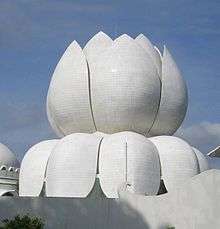Santhigiri
Santhigiri Ashram is located in Pothencode, Thiruvananthapuram District, Kerala.[1] The ashram was founded by Navajyothisree Karunakara Guru[2] and is recognized as a Social and Scientific Research Organization by the Government of India.[3]

The followers of Karunakara Guru have built a beautiful monument called Parnasala in the shape of a blooming lotus in white Makrana marble in the Ashram compound. This unique structure required ten years for completion. It was inaugurated by the President of India Pratibha Devi Patil on 13 August 2010 and was opened for prayers and worship on 12 September 2010. Apart from its spiritual sanctity, The Lotus Parnasala of the Ashram has become a landmark of Trivandrum and attracts many tourists.
Vision
Santhigiri Ashram works towards fulfilling Navajyothi Sri Karunakara Guru's vision of a revitalized life involving spiritual, social, economic and cultural elements.[4]
Navajyothi Sree Karunakara Guru (born 1927, died 1999) was from Chandiroor, Alleppey district, Kerala. His teachings followed the theme of a global spiritual and cultural renaissance in harmony with material progress. The ashram functions as a training center; people can either stay at or visit the ashram and attend services and assimilate in the teachings of the Guru.
Locations
In addition to the main centre in Pothencode, the ashram also have branches in Idukki, Ernakulam, Chandiroor, Haripad, Kollam, Kanyakumari, Kottayam, Madurai, Thrissur, Palakkad, Pathanamthitta, Kozhikode, Kannur, Kottarakkara, HaripadMallapuram and Sulthan Bathery. Branches are also being built in Bangalore and New Delhi.
Activities
Offering free food
One of Guru's objectives was to feed the poor and to this effect the ashram offers an Annadanam or gift of food, at their various centers, to all the visitors as well as inmates.[2][5]
Healthcare
Athurasevanam or care of the ailing is a supporting function to the Guru's vision. The ashram performs this function through a chain of Ayurveda and Siddha research centers,[2][6] hospitals,[7] onsite and offsite health care programs and camps[8] and social research.[3]
Athmabodhanam
Part of the Guru's vision for the ashram is Athmabodhanam or spiritual awakening.[9] The awakening is at two levels - rational and transcendental; the former focuses on elimination of ignorance while the latter focuses on knowledge of reality.[10]
Economic development
As part of the vision of a revitalized life, the ashram focuses on economic development, with an emphasis on trade skills and support for women[11] and cottage industry programs.[12]
References
- "Advani hails contributions of spiritual leaders". The Hindu. 28 April 2008. Retrieved 14 July 2009.
- "Prime Minister to inaugurate ashram's research centre". The Hindu. 24 November 2004. Retrieved 14 July 2009.
- "Directory of Scientific and Industrial Research Organization". Ministry of Science and Technology, Govt of India. November 2007. Retrieved 14 July 2009.
- Tankha, Upendra (11 March 2002). "Between religion and spirituality". The Hindu. Retrieved 14 July 2009.
- "Santhigiri Ashram". India9.com. 14 July 2005. Retrieved 15 July 2009.
- Devraj, Ranjit (2 July 2005). "Herbs and hysteria". Asia Times. Retrieved 15 July 2009.
- "Bulgarian princess visits ashram". The Hindu. 3 November 2009. Retrieved 15 July 2009.
- "Santhigiri Ashram to organise free medical camp". The Hindu. 5 April 2006. Retrieved 15 July 2009.
- "International conference on health in Kottayam". The Hindu. 14 December 2004. Retrieved 15 July 2009.
- "Blind man's buff - Interview with Rajeev Anchal". Rediff.com. Retrieved 15 July 2009.
- "Study materials, uniforms distributed". The Hindu. 7 May 2009. Retrieved 15 July 2009.
- "Santhigiri Ashram for an all-round health". The Tribune. 23 March 2002. Retrieved 15 July 2009.